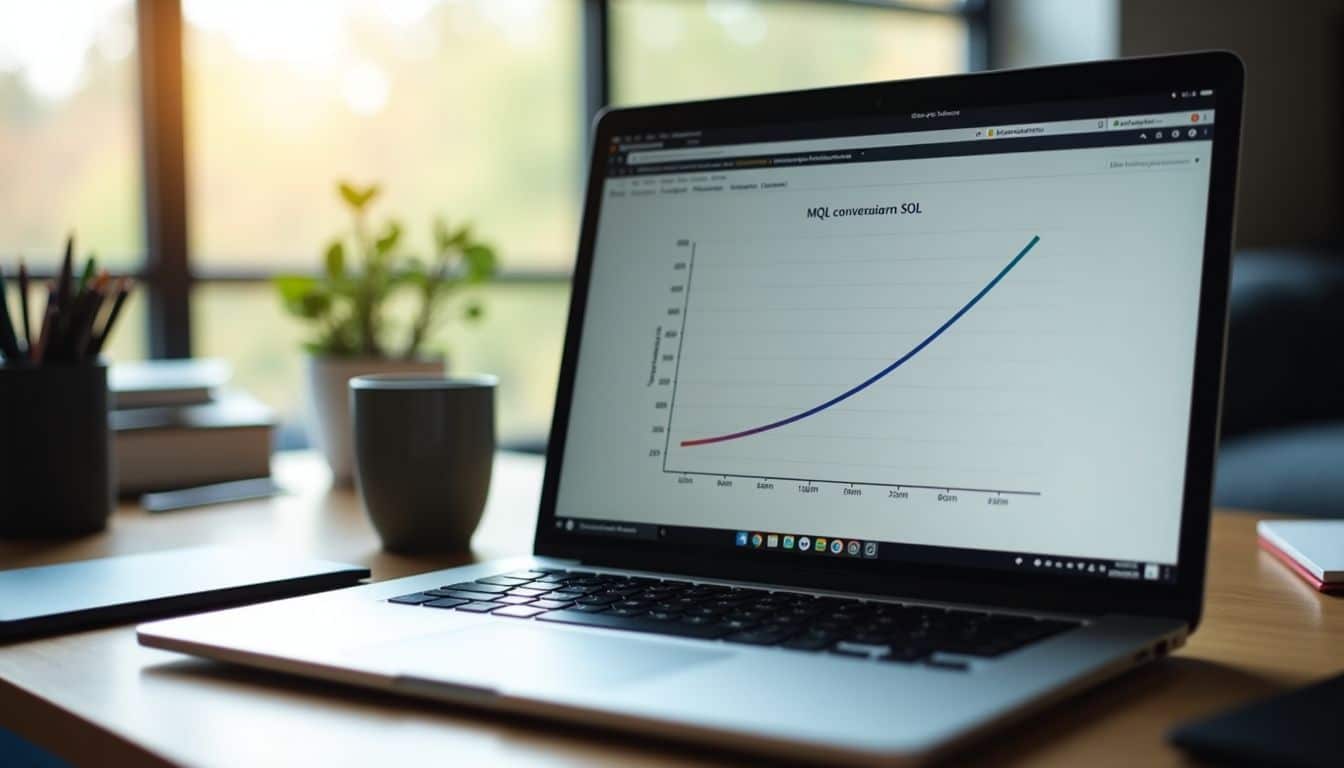Many companies struggle to turn leads into sales. On average, 31% of leads become marketing qualified leads (MQLs). This article will show you how the MQL to SQL conversion rate varies across industries.
Keep reading to boost your conversions.
Key Takeaways
- The average MQL to SQL conversion rate is around 13%, but it can go as high as 51% with effective SEO in the SaaS industry.
- B2B and finance industries share a common conversion rate of about 13%, while targeted strategies like not requiring a credit card for free trials can increase conversions to 10%.
- Sales and marketing team alignment, along with enhancing lead qualification processes, are key strategies for improving MQL to SQL conversion rates.
- Using account-based marketing (ABM) and personalized email campaigns significantly boosts conversion rates across various sectors.
- Regular analysis of lead generation campaigns helps pinpoint areas for improvement, increasing the effectiveness of targeting and nurturing leads.
Understanding MQL to SQL Conversion Rate

Understanding MQL to SQL Conversion Rate involves defining and differentiating between Marketing Qualified Leads (MQL) and Sales Qualified Leads (SQL) as well as recognizing the significance of tracking this crucial metric for evaluating the effectiveness of lead generation efforts.
Industry-specific benchmarks unveil the average conversion rates across various sectors, providing a baseline for comparison and assessment.
Definition of MQL and SQL

MQL stands for Marketing Qualified Lead. This refers to a lead that matches the company’s defined target market and buyer personas. It indicates someone has shown interest in what a company has to offer based on marketing efforts but isn’t yet ready to buy.
SQL, or Sales Qualified Lead, takes it a step further. It represents a lead that the sales team has reviewed and believes is ready for direct sales follow-up. The conversion rate between these two stages plays a crucial role in understanding how effective a company’s marketing strategies are and aligning them with sales objectives.
To calculate the MQL to SQL conversion rate, one divides the number of SQLs by the number of MQLs and then multiplies by 100. Insights from an Implisit analysis show that the average conversion rate is around 13%.
This metric helps businesses measure their success in moving potential buyers through the sales pipeline effectively and fine-tune their lead nurturing processes accordingly.
Importance of tracking this metric

Tracking the MQL to SQL conversion rate illuminates the quality of leads and evaluates the effectiveness of marketing strategies. This metric pinpoints the channels that yield superior leads while also aiding businesses in identifying areas for potential cost reduction without sacrificing sales.
Regular surveillance and modifications based on this rate provide companies with a competitive advantage, keeping them in the forefront of their industry.
Regular enhancement of conversion rates is critical to maintain a competitive edge in the contemporary market.
Gaining a deeper understanding of the cost-efficient measures in marketing efforts, businesses can make educated decisions that spur growth and magnify their return on investment (ROI).
As we continue, comprehension of the industry benchmarks related to these conversion rates would offer additional clarity.
Industry Benchmarks for MQL to SQL Conversion Rates

Different industries have varying benchmarks for MQL to SQL conversion rates, indicating the effectiveness of lead generation and sales processes. By understanding these benchmarks, businesses can gain insights into the performance of their marketing and sales funnels, enabling them to identify areas for improvement and optimization.
B2B industries

B2B industries see an average MQL to SQL conversion rate of 13%. This means that for every 100 marketing qualified leads, about 13 become sales qualified. The factors that influence this conversion include how well the marketing and sales teams work together, the system for scoring leads, and the quality of those leads.
To reach or beat a higher benchmark of 20%, companies must use smart lead generation tactics and personalize their messages.
Improving these rates involves aligning the efforts of sales and marketing teams closely. They should also focus on targeting their lead generation more effectively. Companies have found success by using detailed lead qualification processes.
These strategies make sure that only high-quality leads move forward in the sales pipeline, increasing the chances of turning them into actual customers.
Ecommerce

Providing educational resources enhances customer intent and improves lead qualification processes. These resources are crafted to not only enhance customer intent but also align with marketing strategies aimed at enhancing Ecommerce sales funnel.
Finance
The average MQL-to-SQL conversion rate for financial services is 13%, highlighting the unique challenges this sector faces in optimizing conversion rates due to regulatory concerns.
Effective strategies include emphasizing transparency in pricing and offering complimentary consultations, highlighting the need for personalized approaches within the finance industry.
These insights provide actionable steps for CMOs, founders, and business owners looking to improve their customer acquisition processes in the constantly changing landscape of financial services marketing.
SaaS
MQL to SQL conversion rates for SaaS companies vary depending on factors such as lead generation, customer acquisition, and conversion rate optimization. Small to Mid-Sized B2B SaaS firms typically see an average conversion rate of 39%, while Enterprise level B2B SaaS companies achieve around 40%.
Notably, employing SEO can significantly impact these rates, with organizations using SEO experiencing a notably higher MQL to SQL conversion rate at an average of 51%.
Requiring a credit card for free trials yields a mere 2% conversion rate, whereas not mandating one increases the likelihood to 10%. These statistics highlight the influence of various strategies on the MQL to SQL transition within the dynamic SaaS industry.
For CMOs, Founders and Business Owners seeking growth in this sector, understanding these benchmarks is crucial in formulating effective marketing and sales tactics.
Factors Influencing MQL to SQL Conversion Rates

Effective marketing strategies, well-aligned sales teams, and high-quality leads are key factors influencing MQL to SQL conversion rates. Read on for actionable insights into improving your conversion rates.
Marketing strategies
Effective marketing strategies play a vital role in influencing MQL to SQL conversion rates. Customized lead generation tactics and targeted messaging are crucial for optimizing this metric.
Using personalized marketing approaches can significantly improve customer acquisition and enhance the sales funnel. Data analysis and conversion tracking are vital components in evaluating the performance of these strategies, allowing for continuous improvement to achieve better results.
Moreover, embracing conversion optimization techniques through regular analysis of marketing metrics is essential for driving higher MQL to SQL conversions. Implementing such tactics not only improves lead qualification processes but also helps unveil successful customer relationship management strategies.
Sales team alignment
The alignment of sales and marketing teams is crucial in influencing MQL to SQL conversion rates. When the two departments are aligned, there is a clear understanding of lead definitions, ensuring that both sides work toward the same goals.
This fosters collaboration between sales and marketing, leading to improved communication and a seamless feedback loop for refining lead scoring and enhancing lead quality. Ongoing training for the sales team further ensures that they are well-versed with marketing strategies and goals, enabling them to effectively qualify leads.
These measures collectively contribute to more efficient processes and increased productivity within organizations while driving higher MQL to SQL conversion rates.
Moving on from Sales team alignment…
Quality of leads
Lead quality plays a vital role in influencing MQL to SQL conversion rates. The efficacy of lead generation and nurturing relies on quality leads, steering prospects from showing interest as MQLs to demonstrating strong purchasing intent and meeting sales criteria as SQLs.
It’s crucial for businesses to concentrate on attracting high-quality leads to boost conversion rates, guaranteeing that marketing efforts are focused on engaging prospects with genuine potential to become qualified sales leads.
This focus on lead quality can notably influence the effectiveness of sales and marketing alignment strategies, ultimately improving the overall performance of the lead qualification process.
Strategies to Improve MQL to SQL Conversion Rates

Improving MQL to SQL conversion rates can be achieved by aligning sales and marketing teams, implementing targeted marketing strategies, and enhancing lead qualification processes.
These strategies aim to optimize the handover of leads from marketing to sales, ensuring a seamless transition and maximizing the chances of conversion.
Aligning sales and marketing teams
Effective alignment between the sales and marketing teams is vital for optimizing MQL to SQL conversion rates. Collaborative efforts can prevent potential customer loss due to inadequate data tracking, ensuring a seamless transition from marketing-qualified leads (MQLs) to sales-qualified leads (SQLs).
Using account-based marketing (ABM) enhances personalization specifically for high-value clients, accelerating the MQL to sales conversion process while establishing a follow-up schedule within 5-7 days elevates lead responsiveness.
Implementing targeted marketing strategies that align with the goals and approach of the sales team further strengthens this bond. This cooperation ensures that every lead receives prompt attention and relevant information tailored towards their specific needs, ultimately resulting in improved customer engagement and higher conversion rates.
Implementing targeted marketing strategies
To improve MQL to SQL conversion rates, implementing targeted marketing strategies is essential. Personalized and segmented marketing, along with audience targeting, are effective ways to enhance lead qualification processes and customer segmentation.
By customizing content and offers to the target audience, companies can significantly optimize their marketing funnel. Moreover, this approach promotes better engagement with potential customers and boosts overall conversion rates.
Collaboration between sales and marketing teams is pivotal for the successful implementation of these strategies. Aligning these departments ensures that leads are effectively nurtured throughout the customer journey, ultimately contributing to higher MQL to SQL conversion rates.
It’s evident—implementing targeted marketing strategies not only enhances customer segmentation but also prioritizes lead nurturing tactics essential for improving conversions.
Enhancing lead qualification processes
To increase MQL to SQL conversion rates, implementing targeted marketing strategies and enhancing lead qualification processes is crucial. By aligning sales and marketing teams, the quality of leads generated improves, leading to more qualified prospects.
Regular analysis of campaigns helps identify weaknesses in lead handling and allows for adjustments to be made promptly. Personalized email campaigns have been shown to significantly influence customer behavior, increasing the likelihood of purchases.
Therefore, by focusing on refining lead qualification processes and leveraging targeted marketing strategies like personalized emails, businesses can enhance their MQL to SQL conversion rates effectively.
Implementing Account-Based Marketing (ABM) has been proven to boost MQL to SQL conversion rates within various industries such as finance and SaaS. Besides, a data-driven approach that emphasizes evidence-based insights from campaign analysis aids in identifying weaknesses in lead handling which can then be rectified swiftly.
Tailoring personalized email campaigns towards customer behavior can substantially increase purchase likelihoods in real-world scenarios.
Conclusion

The average MQL to SQL conversion rate varies across industries. Understanding this metric’s importance and industry benchmarks aids in evaluating performance. Factors such as marketing strategies, sales team alignment, and lead quality influence conversion rates.
Strategies like aligning sales and marketing teams can improve these rates significantly.
In conclusion, understanding the average MQL to SQL conversion rate in your industry is crucial for optimizing sales funnel performance. By tracking and analyzing this metric while considering industry benchmarks, businesses can identify areas for improvement.
Implementing effective strategies based on data-driven insights can lead to substantial improvements in MQL to SQL conversion rates, ultimately enhancing overall business performance.
References
- https://www.klipfolio.com/resources/kpi-examples/digital-marketing/mql-to-sql-conversion-rate
- https://www.kixie.com/sales-blog/is-your-mql-to-sql-conversion-rate-competitive/
- https://firstpagesage.com/seo-blog/mql-to-sql-conversion-rate-by-industry/
- https://www.geckoboard.com/best-practice/kpi-examples/mql-to-sql-conversion-rate/
- https://www.poweredbysearch.com/learn/b2b-saas-funnel-conversion-benchmarks/ (2024-09-12)
- https://www.fanruan.com/en/glossary/kpi-examples/mql-to-sql-conversion-rate (2024-09-10)
- https://www.alore.io/blog/mql-to-sql-conversion-rates (2024-04-17)
- https://userpilot.com/blog/mql-to-sql-conversion/
- https://www.dataflo.io/blog/mql-to-sql-conversion-rate (2023-07-24)
- https://www.lift-ai.com/blog/how-to-evaluate-mql-to-sql-stages-and-conversion-rates

